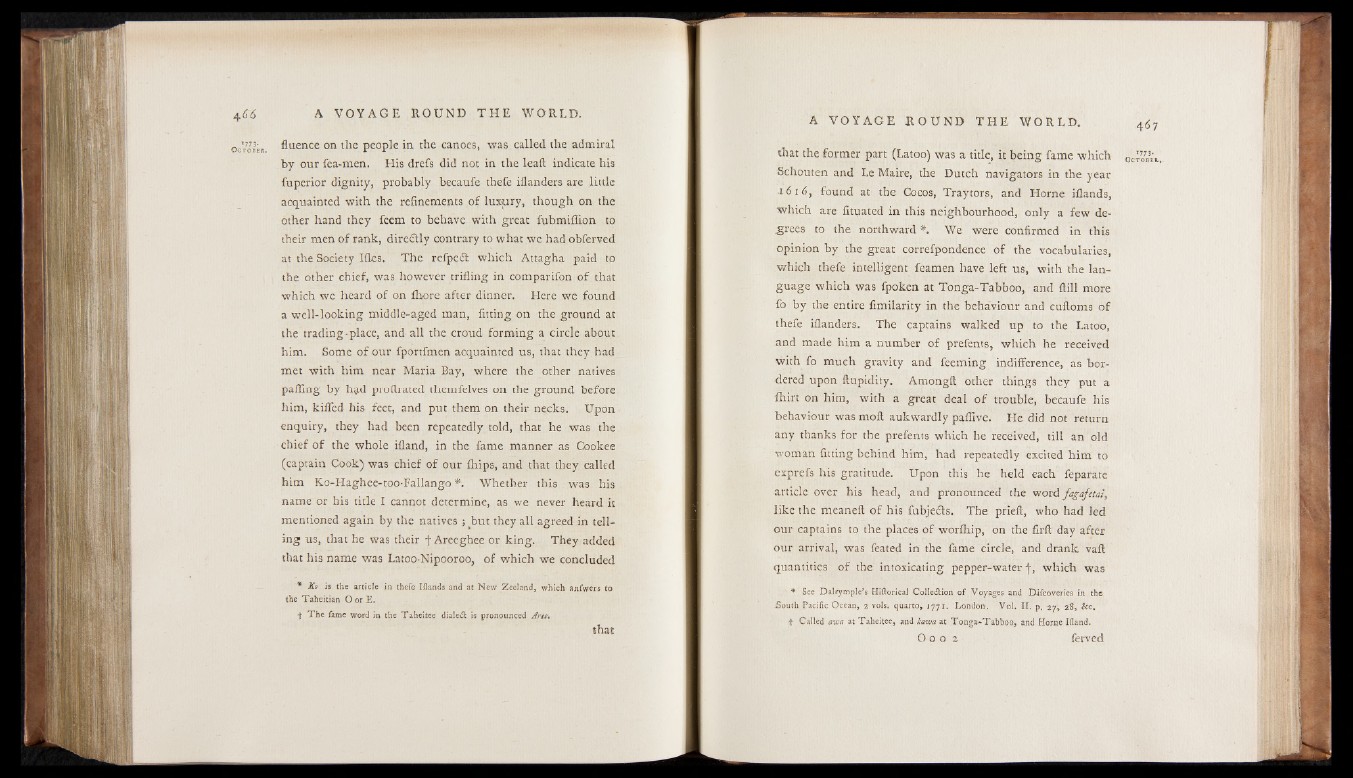
fluence on the people in the canoes, was called the admiral
by our fea-men. His drefs did not in the leaft indicate his
fuperior dignity, probably becaufe thefe iflanders are little
acquainted with the refinements of luxury, though on the
other hand they feem to behave with great fubmiflion to
their men of rank, directly contrary to what we had obferved
at the Society Ifles. The refpedl which Attagha paid to
the other chief, was however trifling in comparifon of that
which we heard of on fhore after dinner. Here we found
a well-looking middle-aged man, fitting on the ground at
the trading-place, and all the croud forming a circle about
him. Some of our fportfmen acquainted us, that they had
met with him near Maria Bay, where the other natives
palling by had proftrated themfelves on the ground before
him, kifled his feet, and put them on their necks. Upon
enquiry, they had been repeatedly told, that he was the
chief of the whole ifland, in the fame manner as Cookee
(captain Cook) was chief of our fliips, and that they called
him Ko-Haghee-too-Fallango p Whether this was his
name or his title I cannot determine, as we never heard it
mentioned again by the natives ; but they all agreed in telling
us, that he was their f Areeghee or king. They added
that his name was Latoo-Nipooroo, of which we concluded
* Ko is the article in thefe Iflands and at N ew Zeeland, which anfwers to
the Taheitian O or E.
t T h e fame word in the Taheitee dialed is pronounced Arte%
that
A V O Y A G E B O U N D T H E WORLD. 4^7
H
that the former part (Latoo) was a title, it being fame which octob’*'«..
Schouten and Le Maire, the Dutch navigators in the year
1616, found at the Cocos, Traytors, and Horne iflands,
which are fituated in this neighbourhood, only a few dec
r e e s to the northward *. We were confirmed in this
opinion by the great correfpondence of the vocabularies,
which thefe intelligent feamen have left us, with the language
which was fpoken at Tonga-Tabboo, and Hill more
fo by the entire fimilarity in the behaviour and cuftoms of
thefe iflanders. The captains walked up to the Latoo,
and made him a number of prefents, which he received
with fo much gravity and feeming indifference, as bordered
upon ftupidity. Amongft other things they put a
Ihirt on him, with a great deal of trouble, becaufe his
behaviour was moll aukwardly paflive. He did not return
any thanks for the prefents which he received, till an old
woman fitting behind him, had repeatedly excited him to
exprefs his gratitude. Upon this he held each feparate
article over his head, and pronounced the word fagafetai,
like the meaneft of his fubjedts. The priell, who had led
our captains to the places of worlhip, on the firll day after
our arrival, was feated in the fame circle, and drank vail
quantities of the intoxicating pepper-water f , which was
* See Dalrymple’s Hiftorical Colle&ion of Voyages and Difcoveries in the
-South Pacific Ocean, 2 vols. quarto, 1771. London. Vo l. II. p. 27, 28, &c.
f Called awa at Taheitee, and kawa at Tonga-Tabboo, and Horne Ifland.
Oo o 2 ferved